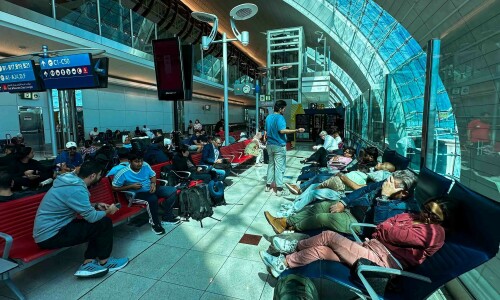
KABUL: Afghans were Wednesday burying 59 people killed in unprecedented bombings against Shia Muslims as officials blamed Pakistani militants, accusing them of trying to whip up Iraq-style sectarian violence.
Investigators are poring over who was behind the coordinated attacks in the Afghan capital Kabul and northern city of Mazar-i-Sharif that the Taliban, the main faction leading a 10-year insurgency, have denied carrying out.
An Afghan official claimed Wednesday that the bomber who attacked a shrine in Kabul was a Pakistani, affiliated to the Lashkar-i-Jhangvi group, which has been blamed for killing thousands of Pakistani Shias.
The faction, which is alleged to have links with Al-Qaeda, — the terror group blamed for igniting sectarian war in Iraq — has not previously claimed responsibility for any attacks in neighbouring Afghanistan.
Experts suggest that if Lashkar-i-Jhangvi or indeed any other Pakistani militants orchestrated the attacks, then elements in the Afghan Taliban may have played some part, possibly in facilitating the strikes.
Tuesday's blast on the holiest day in the Shia calendar marked the first major attack on a key religious day in Afghanistan.
The twin blasts have prompted fears of a slide into sectarian violence in Afghanistan, which until now has avoided the kind of attacks that have pitched Shia against Sunni Muslims in Iraq and Pakistan.
The victims were buried Wednesday in emotional scenes. Several hundred people marched through west Kabul with two of the bodies on the way to a burial ground, an AFP photographer said.
The US embassy confirmed that an American citizen was among the 55 people killed in the Kabul attack but gave no further details.
President Hamid Karzai scrapped a planned trip to Britain, flying back to Afghanistan for an emergency meeting with security chiefs after attending Monday's Bonn conference on his country's future.
He was later due to meet survivors of the attack in hospital.
Lutfullah Mashal, a spokesman for Afghanistan's National Directorate of Security intelligence agency, confirmed that an investigation into the tragedy was now under way.
Sediq Sediqqi, a spokesman for the Afghan interior ministry, said the attack was the work of “the Taliban and their associates”, adding no-one else carried out such suicide attacks in Afghanistan.
An Afghan security official speaking on condition of anonymity said the bomber was from the Kurram agency in Pakistan's border region and was connected to Sipah-i-Sahaba, a Lashkar-i-Jhangvi offshoot.
Many Afghans traditionally blame Pakistanis for fuelling much of the violence in their country.
Lashkar-i-Jhangvi was one of the groups involved in the kidnap and beheading of Wall Street Journal reporter Daniel Pearl in Pakistan in 2002.
It is notorious for suicide bombings and attacks on Pakistani Shias.
The Afghan source added the attack aimed to “inflame sectarian violence in Afghanistan” but did not provide any evidence to back up his claims.
The official added: “This is not the work of the Taliban or if there is any Taliban involvement, it is very minimal.”
A Western security official speaking anonymously also suggested Pakistani involvement though stressed it was not clear whether this was “institutional”.
There are reported links between Lashkar-i-Jhangvi and Pakistani intelligence.
“We're particularly looking at TTP (Tehreek-i-Taliban, the Pakistani Taliban) although at the moment we don't have any proof,” he said. The source added he believed the attack “aimed to weaken Afghan society”.
A Pakistani security official speaking anonymously said Lashkar-i-Jhangvi was closely associated with the Pakistani Taliban.
But he added: “This group is on the run and doesn't have the capacity to carry out attacks inside Afghanistan, particularly in Kabul.”
Pakistani security analyst Hasan Askari emphasised that there was no clear evidence at this stage of Lashkar-i-Jhangvi’s involvement.
“Lashkar people have ideological affinity with other militant groups operating in Afghanistan, including the Taliban, and they support each other but they (Lashkar) have to establish that their strength is increasing,” he said.
Some analysts have raised fears of more sectarian violence in Afghanistan following the attacks but Shia leaders have urged calm in the aftermath.














































Dear visitor, the comments section is undergoing an overhaul and will return soon.